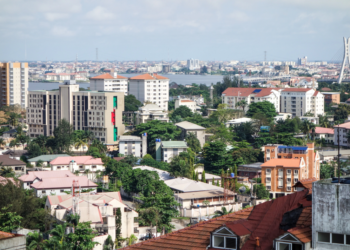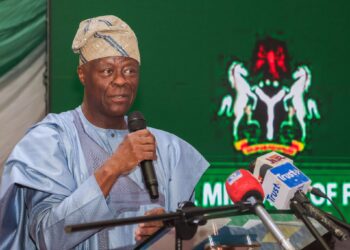Nigeria, Africa’s largest economy, is so over-dependent on crude oil that it makes up about 90% of its export earnings, and more than 60% of Nigeria’s Federal Government revenue. So when low prices, caused by the COVID-19 pandemic started, Nigeria’s economic growth paused.
The country has not been able to use its crude oil wealth to improve the living standards of its people, with a growing population of over 200 million.
The COVID-19 pandemic put Nigeria’s economy in a tight corner, as Brent crude’s value has dropped by half since the worst pandemic in recent history started early this year.
According to a report by a leading American consulting firm, McKinsey & Company, “The subsequent economic fallout for Nigerians will be severe. GDP forecasts are suggesting that if oil prices stay low, GDP growth will be -3.4% in 2020.
Worryingly, this is the prediction if the outbreak is effectively contained in the country. By contrast, if it is not contained effectively, then Nigeria could see GDP growth in 2020 fall to -8.8%, driven by declining consumer spending.”
(READ MORE: Bonny light crude oil crashes as Nigeria runs into deeper revenue crisis)

With the growing odds against Nigeria’s monotonous economy, Omeiza Makoju, ACCA, an energy expert in a leading oil upstream firm, told Nairametrics that the problems Nigeria faces can be attributed to the fact it focuses on just oil. He said:
“Following the COVID-19 outbreak and low oil prices, the revised 2020 budget reflects an increased deficit (now approx. 50% of total budget) which will most likely be funded with a combination of foreign and domestic debt.
“The revised budget also shows that the “Resource Curse” stigma credited to our nation is getting bolder and the diversification of our economy requires critical attention now. With our country’s endowment with enviable natural resources and several attempts by the Federal Governments (FG) to diversify the economy, it still is to be seen how effective the attempts have been.
“The over-dependence on the oil sector as the major source of revenue has led to inadequate attention being given to the non-oil sectors. This is partly the cause of the challenges we have to contend with in funding the 2020 budget.”
(READ MORE:COVID-19: Nigeria cuts revenue targets in anticipation of economic shock)

Makoju, spoke in detail on how Nigeria, a country with 87 million people living on less than $1.90 a day, could diversify its economy. He continued by saying:
“The difficulties we currently face have also shown that an industrial revolution may be crucial for us to achieve the sustainable economic growth needed and we are ripe with the preconditions required. The preconditions include: large population (consumption/workforce), vast arable lands, Ajaokuta Steel and high teledensity, to mention a few.
“The revolution will be most effective when the FG harnesses all these preconditions mentioned which will invariably bring about much-needed diversification and significantly improve our economic output in agriculture, telecommunication, ICT, manufacturing capacity, etc. For the FG’s diversification strategy to be complete, significant investments will be required in associated infrastructure (power, security, and transport networks).
“Without casting a spell, it’s obvious that what was once tagged black gold (crude oil) cannot stand the test of time as demand for crude will never be the same, with renewables and electric automobiles springing up.”
(READ MORE:FG records $9 million transactions from SheTrades since 2016)
Temitope Busari, CFA, in a phone chat interview with Nairametrics, said that it was time for Nigeria as a country to diversify.
“One outcome of the diversification of the Nigerian economy, and perhaps the most critical one at this time, is the potential to diversify our foreign exchange earnings as a sovereign state. It will reduce overdependence on crude oil, maximize opportunities in erstwhile neglected sectors and project the country as the destination for top-class value creation in other areas outside being an oil-producing state.”
She spoke about Nigeria investing more on intellectual property and encouraging Nigeria’s talent in the diaspora by saying:
“I believe the way to go about it is to promote free markets and support large scale exports from the Agricultural, Mining, and Technology space. Additionally, we should focus on the raw diamond that is “intellectual services.”
“We have produced some of the most brilliant minds in the world evidenced by the groundbreaking successes recorded by Nigerians in diaspora (Medical professionals, Software engineers, resilient small business owners to mention a few), and we must begin to drive policies to retain that talent in-country and make the world pay premium dollar for it.
“A good place to start would be to fix the broken education sector, to improve the capacity to churn out more exceptional talents.”
(READ MORE:The CBN data that can reveal whether we are already in a recession)

Ugonna Thelma Ohiri-Anyanwu CFA, in an email sent to Nairametrics, explained, the need for fiscal reforms and tax breaks in supporting Nigeria’s macro fundamentals, she wrote;
“As businesses, individuals and the country come to terms with the reality of falling oil prices and the devaluation of the naira, there is no better time to implement the diversification of the country’s economy from oil, than now.
“Nigeria’s revenue from crude oil is greatly threatened by the current happenings in the global market hence the government needs to quickly explore alternate sources of revenue, such as harnessing the opportunities available in the agricultural and solid mineral sectors. The Government should invest in machinery that would help industrialize these sectors and provide a readily available market for their products.
“Tax breaks could also be given to private investors ready to invest in these sectors. Additionally, value should be extracted from this produce to increase revenue, for example, rather than export cocoa, more value/revenue would be gotten from exporting chocolate instead.
“Furthermore, increased revenue can be gotten from tax if proper data is developed and managed with all income leakage sources detected and blocked.
“Also, citizens would be encouraged to pay their taxes if they are assured that these funds will be utilized properly as against it being mismanaged by the Government.”
Finally, the time is ticking on Nigeria’s policy stakeholders, to start diversifying the economy fast, even before COVID-19 pandemic the world has begun to shift attention from fossil fuel to cleaner, renewable energy.























